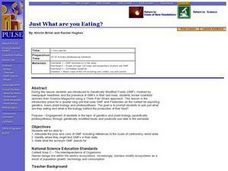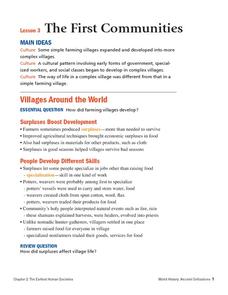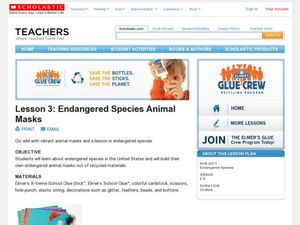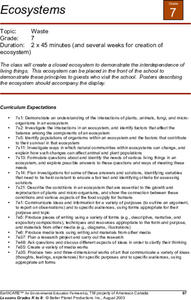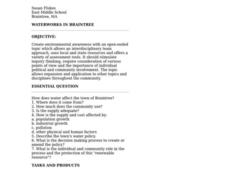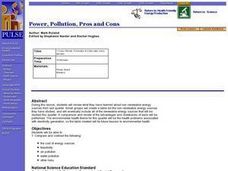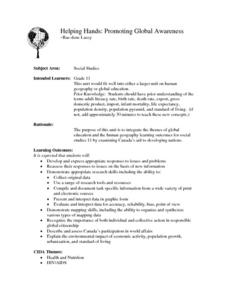Curated OER
Just What are you Eating?
Students identify and articulate pros and cons of genetically modified foods (GMF) including references to scale of controversy worldwide. Students then identify where they might find GMFs in their diets, read different opinion pieces on...
Curated OER
Modeling the Process of Mining Silicon Through a Single Displacement/Redox Reaction
Learners study silicon and where it comes from. In this solar mining lesson students complete an Internet search of mining and a lab activity.
Curated OER
Development, Trade, Aid
Twelfth graders study the term development. In this Economics lesson, 12th graders explore the role of trade in stimulating development, with particular focus on the role played by the British Government. Students decide how aid...
Curated OER
Reading the River
In collaborative groups, young ecologists measure the temperature, pH, and dissolved oxygen for three different freshwater samples. They examine each sample with a microscope and record observations on the microorganisms in the pond...
Alabama Learning Exchange
Nature's Life Cycle
Become a member of the Pollution Patrol and stand up to litter! After discussing the life cycle of seeds and discussing how plants figure into the food chain, young conservationists engage in several activities involving podcasts,...
Houghton Mifflin Harcourt
The First Communities
These documents list essential questions and foundational concepts associated with early civilizations and farming communities in the agricultural revolution. Use this as a starting point for developing specific lessons and activities...
Curated OER
Indigenous People Day
Do you know why we celebrate the International Day of the World's Indigenous People? Did you even know we celebrate this day? After reading a short passage about this international celebration, scholars answer true or false questions,...
Curated OER
See Turtles Nest! See Turtles Hatch!
Students graph data of sea turtles hatching rates from Watamu/Malindi Marine National Park and Reserve in Kenya. In this math lesson, students use real life science data to calculate mean and median values. Students use the data to...
Curated OER
Geography of the Study of the Spanish-speaking People of Texas
Learners identify the physical features, demographic characteristics, and history of the four Texas towns featured in Russell Lee's photo essay, "The Spanish-Speaking People of Texas." They conduct Internet research, and create a travel...
Curated OER
Endangered Species Animal Masks
Students research endangered animals. In this animal science lesson, students visit suggested websites to learn more about endangered animals and create animal masks. Students need glue, cardstock, string and feathers to construct the...
Curated OER
INDUSTRIAL REVOLUTION
Tenth graders identify causes and effects of the Industrial Revolution, analyze the benefits and negative consequences, describe the operation of British government, and identify British social and political reforms resulting from the...
Curated OER
The MPA “GamePlan”
Eighth graders explore the purpose of having Marine Protected Areas. In this environmental science lesson plan, 8th graders simulate the planning process by playing a board game. They explain the positive and negative effects of trade offs.
Curated OER
Ecosystems
Seventh graders create a closed ecosystem and place it where is it visible to others in the school. They label it with posters describing the interdependence of living things in the ecosystem. They discuss what might happen to the...
Curated OER
Site and Situation: Right Place at the Right Time
Middle schoolers put their geography skills to work. In this geography skills lesson, students research maps and other primary and secondary sources to simulate the site selection process for the Pennsylvania Railroad Shops post World...
Curated OER
Patterns of Settlement in Early Alabama
Fourth graders study the settlement of Alabama. They collect data from the U.S. census website and answer questions regarding settlement patterns in the counties of Alabama in 1820. They write a paagraph describing where they would have...
Curated OER
Arsenic Globally
Students, using directed questions, identify five internet resources. They use these resources to identify relevant information by highlighting those sections that address the provided questions. Students present the answers to these...
Curated OER
Power, Pollution, Pros and Cons
Students review what they know about non-renewable energy, compare and contrast advantages and drawbacks of each type, such as cost of energy sources, feasibility, air pollution, water pollution, and other risks, and create table listing...
Curated OER
Science: 4 X 4
Students generate four statements and four questions based on their current level of understanding of the article from the engage lesson. They
evaluate the statements and questions that they have generated and those of their classmates...
Curated OER
Rivers And Capitals
Students become familiar with the use of GIS for research and become aware of the importance of rivers to cities. They also analyze the placement of cities and learn the names of rivers in the United States.
Curated OER
Helping Hands: Promoting Gloval Awareness
Eleventh graders explore Canadian support for foreign aide. In groups, 11th graders discuss Canadian aide policies and express their opinion of each. Students brainstorm methods of contributing to developing nations. They complete...
Curated OER
Environmentalism: Then and Now
Tenth graders examine the history of the conservation movement and how it relates to contemporary issues. In this Environmental Science lesson, 10th graders research the roots of the environmental and conservation movement and...
Curated OER
Biological Sampling Device Using a Sea Perch
Learners construct plankton nets to be towed and collect specimens to be examined and analyzed in the classroom. They develop research skills through collection of an aquatic sample. They write lab reports after interpreting, identifying...
Curated OER
Save Our Soil
Students explore the need for good farm land and reasons for the disappearance of agricultural areas. They brainstorm environmental friendly decisions and soil conservation. In their community, students explore new land developments...


